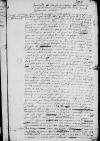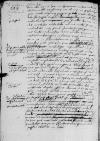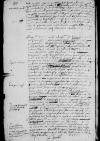Ioannes de Curiis Dantiscus, episcopus Culmensis etc. et ad ecclesiam Varmiensem postulatus etc. Domino Iacobo Graciano salutem.
Quod ⌊⌋ tuis, quas, si recte meminimus, trinis exemplis accepimus, hucusque non rescripserimus, in causa fuit expectatio responsi ad nostras,
quas ad quosdam amicos nostros et ad ipsam ⌊Isabellam⌋, matrem ⌊sponsae⌋ tuae, dederamus, quandoquidem iis mentem nostram de illa et filia declaravimus – quod neque te porro, ut arbitramur, latere potuit – persuadentes nobis litteras manu nostra scriptas et a domino Ehingero[1] ⌊matri⌋ redditas te legisse. Ad eas
cf. Adagia 1526 No. 3385 ne punctum quidem ⌊ne iota quidemcf. Adagia 1526 No. 3385 ne punctum quidem ⌋ illa rescribi nobis curavit, neque in praesens cum ⌊⌋, non secus atque si numquam recepisset, connivens nimirum supina aure ad ea, quae nos, ut serio sciremus, tum ex nostra, tum etiam ex re illius esse putavimus, quasi vero multam Circeam bibisset mandragoram[2]. Atqui longe fuisset illi utilius commodiusque, si poto elleboro[3] nostris admonitionibus paruisset, verum imprudens mulier id nobis ut alienum venum ire et praesenti pecunia voluit, quod prius nostrum esse confirmabat. Quis autem adeo
cf. Cic. Fat. 10 Zopyrus stupidum esse Socratem dixit et bardum ⌊stupidus et barduscf. Cic. Fat. 10 Zopyrus stupidum esse Socratem dixit et bardum ⌋ est, ut id, quod suum est, sciens emat? Eoque nobis, qui alias in malum minime suspicaces esse solemus, quiddam gravioris opinionis, et fortassis non incertae , non sine pungente scrupulo iniecit. Quam quidem opinionem per tuas litteras initumque coniugium, quod tibi et novae nuptae felix faustumque esse optamus, adimi nobis non gravate sustinemus, utpote pro tuis virtutibus eruditioneque non vulgari atque pro veteri nostra in te propensione tibi volentes optime, hancque amicam in te nostram cogitationem et voluntatem consum{m}ato modis legitimis matrimonio non obscure agnosces, reque ipsa experieris. Tu modo, quod facis interim, cura, ut tibi honestis moribus pro paterno tuoque decore coniunx in ea qua est aetate educetur ac instituatur. Ceterum, quod hinc petis stipendium pro negotiis nostris in aula vestra obeundis, non tibi deesset opera adminiculumque nostrum, verum hoc tempore nobilis quidam ex nostratibus ⌊Fabianus⌋, qui nobis, cum oratorio fungeremur munere in ⌊Hispaniis⌋, aliquot annis inservivit, ⌊Isabellae⌋ non incognitus et tibi fortasse notus, hanc gerit provinciam. Illi scribemus, ut tecum super iis conferat tecumque dispiciat, quod ex tuo negociorumque tractandorum usu esse possit. De annua pensione non est quod ⌊Isabellae⌋ debemus, cum oblatam toties condicionem non susceperit. Si nostris obsecuta non iniquis monitis pactum, quod inire cum illa voluimus, admisisset, iam quod quereretur et de quo
cf. Phaed. 1.13.1-2 qui se laudari gaudet verbis subdolis / sera dat poenas turpes paenitentia ⌊sera ducitur paenitudinecf. Phaed. 1.13.1-2 qui se laudari gaudet verbis subdolis / sera dat poenas turpes paenitentia ⌋, non haberet. Nihilo secius , licet spes non sit, ut licentioris institutum vitae turpi consuetudine, cuius maxima est vis, conflatum relinquere possit, poteris tamen illi nostro nomine viginti numerare aureos, quos tibi per oportunitatem reddi faciemus, quibus si
cf. Porph. Com. in Hor. Art. 1. 6. 22 quoniam in propria non pelle quietem Ex proverbio sumptum est; eos namque, qui mediocritatis suae obliti maiora se ipsis adpetunt, solemus dicere noncontinere se intra pelliculam suam; Adagia 1526 No. 592 intra tuam pelliculam te contine ⌊intra pelliculam redienscf. Porph. Com. in Hor. Art. 1. 6. 22 quoniam in propria non pelle quietem Ex proverbio sumptum est; eos namque, qui mediocritatis suae obliti maiora se ipsis adpetunt, solemus dicere noncontinere se intra pelliculam suam; Adagia 1526 No. 592 intra tuam pelliculam te contine ⌋
hones
tati iniciari ceperit, quottannis subsidii aliquid a nobis tuto expectabit. At veremur , quemadmodum
cf. Suet. Ves. 16.3 Quidam natura cupidissimum tradunt, idque exprobratum ei a sene bubulco, qui negata[m] sibi gratuita[m] libertate[m], quam imperium ade[m]ptum suppliciter orabat, proclamaverit, vulpem pilum mutare, non mores.; Adagia 1526 No. 2219 Lupus pilum mutat, non mentem ⌊vulpes quod pilos quidem accedente aetate sit mutatura, sarta tecta atque integra manente naturacf. Suet. Ves. 16.3 Quidam natura cupidissimum tradunt, idque exprobratum ei a sene bubulco, qui negata[m] sibi gratuita[m] libertate[m], quam imperium ade[m]ptum suppliciter orabat, proclamaverit, vulpem pilum mutare, non mores.; Adagia 1526 No. 2219 Lupus pilum mutat, non mentem ⌋. Non est aliud, quod conquisite in praesentia ad te scribamus occupati auro ad ⌊urbem⌋ mittendo, quo confirmationem postulationis seu translationis hinc nostrae ad ecclesiam Varmiensem, quae pinguioris in triplo fortunae, quam haec nostra est, emere cogimur. Bene vale, et amicis, qui te suis litteris nobis commendarunt plurima nostro nomine salute impartire[4].
Ex ⌊castro nostro Lubaviensi⌋, XVI Novembris anno Domini MDXXXVII.
Postscript:
Non abs re et hoc, mi Graciane, in tuam notitiam deducendum existimavi, ne de me in posterum quoquo modo conqueri possis, quod ratione dotis, quam tibi fortassis amplam , nihil debebo, ⌊matris⌋ potissimum causa , quae ⌊puellam⌋ bonis et commodis invitata condicionibus ad me mittere semper est reluctata, nisi prius ducentos praesenti pecunia a me haberet ducatos. Hanc cum illa exercere mercaturam indignissimum iudicavi, eaque animum meum longe a se
et filia abdicavit. Si illa minime fucato candori meo, quem olim sine omni labe cognovit et integrum, credidisset, iampridem vel per ⌊dominum Albertum Kuon⌋, aut per compatrem meum dominum ⌊Ulricum Ehinger⌋ ad me dedisset ⌊filiam⌋, contemplatione ⌊cuius matris⌋ non fuissem oblitus, curassemque vita mea durante et hinc ex testamento, si Deo inservire voluisset, ad quod servitium atque ad honestatem
amplectendam
hortatus sum eam semper, quod illi omnia ad victum
cf. Ov. Am. 3.7.45-46 Credo etiam magnos, quo sum tam turpiter usus, muneris oblati paenituisse deos; Dantisci Carmina 39.72 deliciae, quibus es turpiter usa satis ⌊sine corporis questu, quo abusa est turpiter,cf. Ov. Am. 3.7.45-46 Credo etiam magnos, quo sum tam turpiter usus, muneris oblati paenituisse deos; Dantisci Carmina 39.72 deliciae, quibus es turpiter usa satis ⌋
suffecissent necessaria. Neque sponsae tuae hic sponsus
defuisset. Atqui , cum tanto a me intervallo dissideat, neque spes est videndi eam umquam, non secus atque si in vivis non esset mihi venit existimanda.
Quicquid ex ea voluptatis paternae mihi debebatur, tu praeripuisti, et, cum
cf. Ov. Met. 1. 366 sic visum superis ⌊sic superis visum estcf. Ov. Met. 1. 366 sic visum superis ⌋, iam me non invito tibi eam habe. Quod si adhuc dos esset mittenda, duplici afficerer damno, et tu commodo duplici. Satis sit igitur tibi in uno, cum mihi ex illa cedit nullum. Nihilo tamen secius, postquam consumaveris matrimonium, quod fortassis, ut estis ad libidinem procliviores supra aetatem, iam factum est , non deerit tibi et ⌊illi⌋, ubi possum, beneficentia mea , adeoque et per oportunitatem munificentia. Haec ideo liberius et apertius tecum ago, ne suspicari de me aliud atque aliud causari possis, rebus et fortunis tuis alias libenter commodaturus. Iterum bene vale inque Dei timore et amore sponsa tua, quam meo nomine salutabis, fruere. Mittam illi paulo post, quo se et oblectare, meique memoriam habere possit. Datum ut in litteris.
[1 ] ⌊Heinrich Ehinger⌋ or ⌊Ulrich Ehinger⌋. Both brothers are mentioned in Dantiscus’ letters in the context of issues related to his Spanish family, so it is hard to determine which brother is being referred to here (cf. letters ⌊⌋, ⌊⌋, and the postscript to the present letter). Both brothers died in 1537. The ⌊⌋ mentioned here reached her in late June 1537
[2 ] Mandragora is a Mediterranean medicinal perennial plant with a forked root shaped like a human figure; the ancients ascribed narcotic, soporific and magical properties to it; Circe used a mandragora brew to turn humans into animals (cf. KOPALIŃSKI 1990 p. 646 ⌊Kopaliński, p. 646cf. KOPALIŃSKI 1990 p. 646 ⌋; cf. also e.g.
cf. Plin. Nat. 25.147.5 mandragoran alii Circaeon vocant ⌊Plinycf. Plin. Nat. 25.147.5 mandragoran alii Circaeon vocant ⌋ and
cf. Adagia 1526 No. 3464 Bibere mandragoram (eandem Circeam appellant) ⌊Erasmuscf. Adagia 1526 No. 3464 Bibere mandragoram (eandem Circeam appellant) ⌋
[3 ] Elleborum (hellebore), a plant used in ancient medicine as a remedy for mental diseases as well as a reviving tonic and a laxative (cf. e.g. Porph. Com. in Hor. Art. 300.2 Locus est in Achaia Anticyra, ubi elleborum nascitur, quo sumpto dementes sanantur. Hoc etiam sumpto et dolor capitis sanatur.; there are also mentions of madness being treated with hellebore in the works of cf. Pl. Men. 913, 950 ⌊Plautuscf. Pl. Men. 913, 950 ⌋,
cf. Mart. ⌊Martialiscf. Mart. ⌋ and cf. Col. ⌊Columellacf. Col. ⌋
[4 ] Dantiscus received letters recommending Gracián from: Juana Dantisca (⌊⌋), Luis Núñez Cabeza de Vaca (⌊⌋), Gonzalo Pérez (⌊⌋), Ulrich(?) Ehinger (⌊⌋), Alfonso Polo (⌊⌋), Guevara (⌊⌋), Reinaldo Strozzi (⌊⌋)


